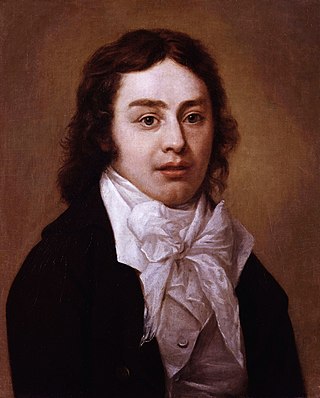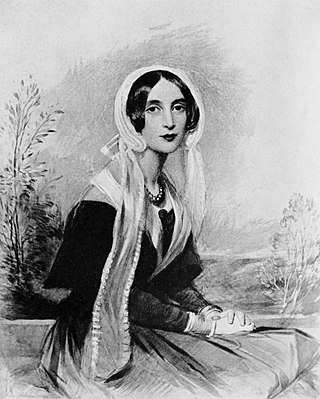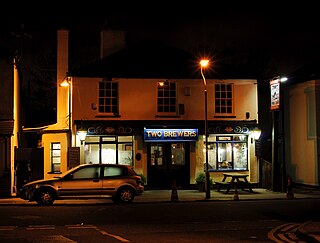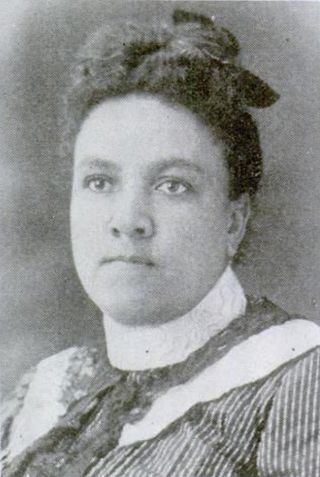Related Research Articles

Samuel Taylor Coleridge was an English poet, literary critic, philosopher, and theologian who was a founder of the Romantic Movement in England and a member of the Lake Poets with his friend William Wordsworth. He also shared volumes and collaborated with Charles Lamb, Robert Southey, and Charles Lloyd.

Highgate is a suburban area of London at the northeastern corner of Hampstead Heath, 4+1⁄2 miles north-northwest of Charing Cross.

Sara Coleridge was an English author and translator. She was the third child and only daughter of the poet Samuel Taylor Coleridge and his wife Sara Fricker.

Samuel Coleridge-Taylor was a British composer and conductor. Of mixed-race descent, Coleridge-Taylor achieved such success that he was referred to by white musicians in New York City as the "African Mahler" when he had three tours of the United States in the early 1900s. He was particularly known for his three cantatas on the epic 1855 poem The Song of Hiawatha by American Henry Wadsworth Longfellow. Coleridge-Taylor premiered the first section in 1898, when he was 23. He married an Englishwoman, Jessie Walmisley, and both their children had musical careers. Their son, Hiawatha, adapted his father's music for a variety of performances. Their daughter, Avril Coleridge-Taylor, became a composer-conductor.
Raphael Elkan Samuel was a British Marxist historian, described by Stuart Hall as "one of the most outstanding, original intellectuals of his generation". He was professor of history at the University of East London at the time of his death and also taught at Ruskin College from 1962 until his death.

Amanda Christina Elizabeth Aldridge, also known as Amanda Ira Aldridge, was a British opera singer and teacher who composed love songs, suites, sambas, and light orchestral pieces under the pseudonym of Montague Ring.
The African Progress Union (APU) was founded in London in 1918 as "an Association of Africans from various parts of Africa, the West Indies, British Guiana, Honduras and America, representing advanced African ideas in liberal education". The first president was John Archer. He was succeeded in 1921 by John Alcindor. Others involved as founders included John Eldred Taylor, Thomas Horatio Jackson and Dusé Mohamed Ali.
British jazz is a form of music derived from American jazz. It reached Britain through recordings and performers who visited the country while it was a relatively new genre, soon after the end of World War I. Jazz began to be played by British musicians from the 1930s and on a widespread basis in the 1940s, often within dance bands. From the late 1940s, British "modern jazz", highly influenced by American bebop, began to emerge and was led by figures such as Sir John Dankworth, Tony Crombie and Ronnie Scott, while Ken Colyer, George Webb and Humphrey Lyttelton played Dixieland-style Trad jazz. From the 1960s British jazz began to develop more individual characteristics and absorb a variety of influences, including British blues, as well as European and World music influences. A number of British jazz musicians have gained international reputations, although the music has remained a minority interest there.

Selhurst is an area in the London Borough of Croydon, England, 7.8 miles (12.6 km) south-south-east of Charing Cross. Historically, it lays in Surrey County. The area is bounded to the west and south by Thornton Heath and Croydon and to the east and south by South Norwood and Woodside respectively. Selhurst Park, the home stadium of Crystal Palace Football Club, is sited at the northern end of the neighbourhood.

Gwendolen Avril Coleridge-Taylor was an English pianist, conductor, and composer. She was the daughter of composer Samuel Coleridge-Taylor and his wife Jessie.
Leslie Anthony Joseph Thompson was a Jamaican jazz trumpeter and trombonist who moved to England in 1929.
"To the River Otter" is a sonnet by Samuel Taylor Coleridge. Though its date of creation is uncertain, it was possibly composed in 1793. It deals with the image of the River Otter, near Coleridge's childhood home in Devon.

The Song of Hiawatha, Op. 30, is a trilogy of cantatas written by Samuel Coleridge-Taylor between 1898 and 1900. The first part, Hiawatha's Wedding Feast, was particularly famous for many years and made the composer's name known throughout the world.

John Alcindor was a physician and activist from Trinidad who settled in London. He is known for his role in the African Progress Union, of which he became president in 1921.
Marika Sherwood is a Hungarian-born historian, researcher, educator and author based in England. She is a co-founder of the Black and Asian Studies Association.

Stephen Bourne is a British writer, film and social historian specialising in Black heritage and gay culture.
Nubian Jak Community Trust (NJCT) is a commemorative plaque and sculpture scheme founded by Jak Beula that highlights the historic contributions of Black and minority ethnic people in Britain. The first NJCT heritage plaque, honouring Bob Marley, was unveiled in 2006 after "two years of research and behind the scenes negotiating". The scheme has been run and managed by the not-for-profit organization Nubian Jak Trust Ltd since August 2016, with a remit to commemorate and celebrate the diverse history of modern Britain. Its objectives include the promotion of social equality and to encourage activities that promote cultural diversity in society.
Chineke! Orchestra is a British orchestra, the first professional orchestra in Europe to be made up of majority Black & ethnically diverse musicians. The word Chineke derives from the Igbo language meaning "God". The orchestra was founded by musician Chi-chi Nwanoku CBE and their debut concert was in 2015 at Queen Elizabeth Hall in London.

Mamie Hilyer was an African American pianist and promoter of classical music, who founded the Treble Clef Club (1897) and the Samuel Coleridge-Taylor Choral Society (1901) in Washington D.C., playing a significant role in nurturing the district's musical culture.
References
- 1 2 3 "Papers of Jeffrey Green", Archives Hub.
- 1 2 3 "Jeffrey Green. Historian". Jeffreygreen.co.uk. Retrieved 15 February 2016.
- ↑ Dominique-Rene de Lerma, "Samuel Coleridge-Taylor: a musical life by Jeffrey Green – a review". Samuel Coleridge-Taylor Foundation, 24 February 2012.
- ↑ Jeffrey Green, "033: Leslie Thompson 'Swing from a Small Island'".
- 1 2 "Jeffrey Green" at Black British History.
- ↑ Jeffrey Green page, History Today.
- ↑ Jeffrey Green (October 2000). "Before the Windrush". History Today. 50 (10). Retrieved 15 February 2016.
- ↑ "What's Happening in Black British -History III - Session 3 - Jeffrey Green" Archived 13 May 2016 at the Wayback Machine , School of Advanced Study, University of London, 29 October 2015.
- ↑ Jeffrey Green, "Do we really know Samuel Coleridge-Taylor?" Talk for the BASA (Black & Asian Studies Association) Conference, London, 27 June 2009.
- ↑ Green, Jeffrey (23 January 2013). "Jeff Green Seeks info on African American Fugitive 1850s". Blackpresence.co.uk. Retrieved 15 February 2016.
- ↑ "Black, Asian and Minority Ethnic (BAME) Education Resources: UK Black History Resources". UCL Institute of Education Library. Retrieved 26 May 2021.
- ↑ "Black History Now High On the Agenda | Web Resources". seancreighton1947. 20 June 2020. Retrieved 25 May 2020.